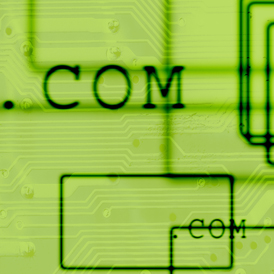Do internet domain name changes spell the end for .com?
A compelling brand opportunity or an online mess? Internet expert Theo Hnarakis writes for Channel 4 News on the significance of expected changes to internet domain names.

On Monday the governing body for Internet domain names, ICANN, is expected to approve the final rules to allow organisations to register their own names at the top of the internet name hierarchy.
So instead of .com or .co.uk, in future you’ll likely see .hotel, .bank, .beer as well as company brands like .canon, .deloitte or .hitachi. Organisations may register keywords that relate to their products, such as .camera or .printer. Cities are considering their own Internet name – for example .london or .nyc.
For marketeers, the creative possibilities are exciting. Think justdoit.nike, enjoy.coke, or getwings.redbull. They’ll all be possible.
Catchy domain names like these will be perfect for boosting advertising recall. If you want to buy an iPad, instead of typing in www.apple.com/ipad you could potentially in future just go to ipad.apple.
They’ll also convey brand trust and security. If a brand secures its name as a .brand domain, it controls it – meaning a fraudster can’t set up a site using that domain, and as a consumer you know it’s legit. If you’re a HSBC customer and do your online banking through an .hsbc address, you’re assured you’re at the right place – and ICANN is unlikely to allow a .hzbc or .hcbs address for you to accidentally type in and be taken somewhere malicious.
Read more: Is the sky the limit for Apple's new iCloud?
There are many more benefits to be had. However, there are some things to consider before diving in for a .brand.
Firstly, the cost. The application fee alone will be $185,000 (£115,000). Secondly, human behaviour. We’ve grown used to .com and .co.uk, and most of us just type those in automatically when guessing a company’s web address. Is that behaviour going to change? And will these new names just confuse customers rather than make the online experience easier to navigate?
This explosion in new domain names is likely to create some confusion for consumers at first, as we all get used to the new names (“No Dad, you don’t need to put .com at the end!”).

The end of .com?
Organisations will still most definitely need to maintain their .com and .co.uk presence because consumers are not going to switch to the new .brand overnight. And from a brand protection perspective, you don’t want anyone else to take your existing names.
However in the long term, it is easy to foresee that we’ll adapt to the new names, confusion will disappear as they become commonplace, and a prestige element may emerge for those businesses with their own .brand domain.
Companies should consider the implications for search engines as well. The ability to be found easily via search is vital for online success, and a .brand provides a company with as many keyword domains as it likes – which all help push that site up higher in the results returned by search engines like Google.
For example, if you want to buy a Sony Bravia TV, a domain like sonybravia.johnlewis would probably fare very well in search results and help John Lewis capture a greater share of online buyers. Owning a .brand also gives marketeers flexibility with future, unthought-of brands as they have the comfort of knowing they can register what they want under a .brand instead of competing for that name.
There are not just positive benefits. Brands should consider the need for defensive registrations as, somewhere in the world, another organisation with a legitimate claim may try to register a name matching your brand. For example, who will apply for .amazon – the online bookstore or the Brazilian Government? Brand owners need to assess the risks, as well as the benefits.
If the decision on June 20 goes as the industry expects, applications will open in late 2011 and close about 60 days later. And after that, it may be years before more top level names are released.
While a .brand might not suit all organisations, the “wait and see” approach that many marketeers took with social media will not work this time, as it is not possible to be a fast follower. This is the biggest change in internet names in the last 25 years. This new naming system will potentially change the way consumers interact with the internet in future, and it represents a compelling digital marketing opportunity. It has the potential to provide brands with a significant online competitive edge over those who don’t inhabit the top of the internet name hierarchy.
Time will soon run out. Brand owners must get their heads around this change and make the big decisions now.
Theo Hnarakis is CEO of Melbourne IT
Read more technology stories
-

Hacked security giant offers to replace 40m key fobs
07 June 2011
-

China denies Google Mail hacking accusations
02 June 2011
-

Smart phone app Mobli helps ‘see through eyes of a friend’
22 May 2011







